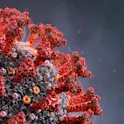
Featured news
27 Feb 2023
How do you talk to a whole country about Covid-19? Use a GIF.
by Dr Siouxsie Wiles, University of Auckland Image by Stephen Langdon, courtesy of Siouxsie Wiles. Siouxsie Wiles is a microbiologist and award-winning science communicator based at the University of Auckland in Aotearoa New Zealand. Her academic research focuses on how the infectiousness of bacteria changes over time and developing new antibiotics. During the early days of the Covid-19 pandemic, she worked with cartoonist Toby Morris to create simple graphic messages that could get public health information out to the general public quickly and effectively, reassuring and informing people throughout Aotearoa New Zealand and around the world. In this guest editorial for Frontiers, Dr Wiles explains how she came to create the famous ‘flatten the curve’ GIF. If you used or lurked on Twitter in March 2020, chances are you saw, or even shared, an animated GIF illustrating how our actions could help ‘flatten’ the Covid-19 ‘curve’. The teal and orange GIF toggled between two scenarios. In the ‘whatever’ approach, a person downplays the seriousness of Covid-19, which soon leads to healthcare capacity being overwhelmed. In the alternative ‘don’t panic, but be careful’ approach, a person is shown promoting such things as staying home when sick, which helps ‘flatten the curve’ […]













